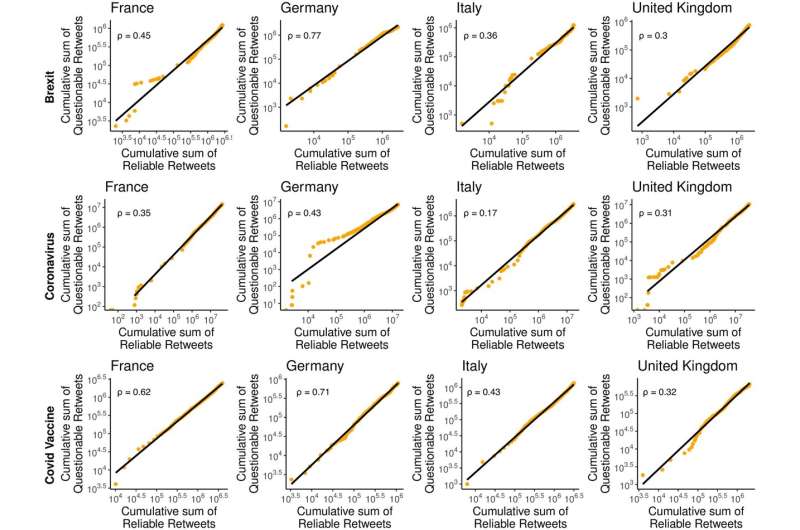
The eventual prevalence of a piece of misinformation may depend on its topic and the country in which it spreads, with notable differences between the UK, Germany, France and Italy, according to a study published May 8 in the open-access journal PLOS ONE by Fabiana Zollo from the Ca’ Foscari University of Venice, Italy, and colleagues. This finding suggests that policies to combat misinformation and polarization may need to be context-specific in order to be effective, the authors say.
Researchers analyzed news activity on Twitter (now X) in France, Germany, Italy and the UK from 2019 to 2021, including a focus on news about Brexit, the coronavirus, and the COVID vaccines. Each news source they analyzed was rated as either “reliable” or “questionable” based upon their NewsGuard (a tool that evaluates the reliability of news outlets based on nine journalistic criteria) score.
Across all four countries, the vast majority of users only ever consumed reliable news sources on each of the three topics. But in every country and in each topic, there was always a small percentage of users who only ever consumed questionable news sources—with very few people consuming a mix of both reliable and questionable sources.
The ratio of questionable news vs. reliable news consumption and spread varied between countries. Overall, Germany had the highest ratio of questionable news retweets to reliable news retweets on all three topics, with France in second, followed by Italy, and the UK had the lowest proportion of questionable news retweets overall.
However, measures of misinformation varied by topic. Italy, for example, had the lowest proportion of questionable news retweets for the topic of the coronavirus—but had the highest percentage of people consuming only questionable news sources on Brexit. These kinds of differences could emphasize that “cultural nuances” will be important when it comes to fighting misinformation, the authors write.
More information:
News and misinformation consumption: A temporal comparison across European countries, PLoS ONE (2024). DOI: 10.1371/journal.pone.0302473
Citation:
The spread of misinformation varies by topic and by country in Europe, study finds (2024, May 8)
retrieved 8 May 2024
from https://phys.org/news/2024-05-misinformation-varies-topic-country-europe.html
This document is subject to copyright. Apart from any fair dealing for the purpose of private study or research, no
part may be reproduced without the written permission. The content is provided for information purposes only.




/cdn.vox-cdn.com/uploads/chorus_asset/file/24748328/236706_Mac_Pro_AKrales_0094.jpg)


